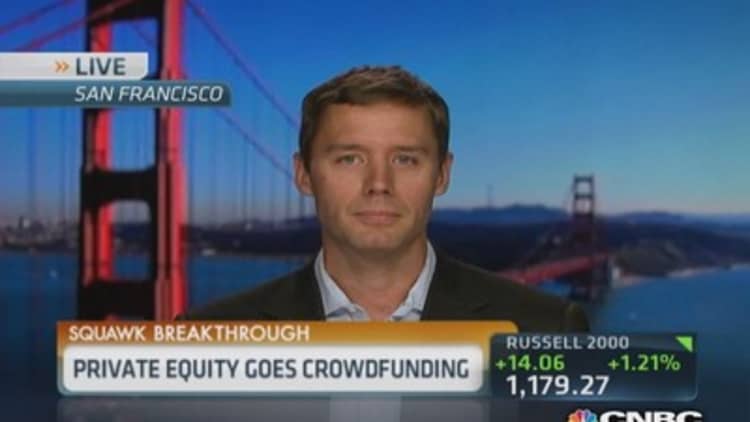London's predominance as the world's leading financial hub might be called into question, but now some are arguing that technology for the financial industry - or fintech – could be its saving grace.
A string of mis-selling and rate-fixing scandals, rogue traders and questions about the U.K.'s position in Europe saw the British capital lose the top spot in Long Finance's Global Financial Centres Index for the first time this year.
New York now leads the way as the world's top financial hub, and of the top 50 cities on the index, London's rating fell the most this year.
But there is a new opportunity on the city's horizon, which could help bolster its global standing: fintech, which develops technology ranging from mobile banking apps to crowdfunding platforms.

"The best fintech businesses are coming out of London," Jeff Lynn, co-founder and CEO at equity crowdfunding platform Seedrs, told CNBC. "It's where job and wealth creation is going to come from."
Read MoreHow long until Europe builds a Google?
In fact, many think the financial crisis – and subsequent reputational damage to banks – only served to bolster fintech's growth.
"The public was disenfranchised, frustrated and demanding better service," Claire Cockerton, deputy head of Level39 technology accelerator, told CNBC. "That environment of frustration and scandal was the birthplace of fintech innovation."
'Regulation stifles innovation'
An American, Lynn said he chose to set up shop in London – rather than in his home country – because of the favorable regulatory environment.
"The U.S. can be a very innovative place, but when it comes to fintech, regulation stifles innovation," he said.
American financial regulation has its roots in the 1930s, Lynn said, whereas the British system dates back to 2000. "It's significantly more flexible and adaptable," he said. "We couldn't do what we do in the U.S."
Read MoreA start-up's guide to getting investment
In fact, Simon Devonshire, director at start-up accelerator and investor Wayra Europe, said London had led the way when it came to crowdfunding in particular.
"The determination and tenacity of those driving crowdfunding in the U.K. - despite a lack of clear regulation and heavyweight incumbents – has made it work," he told CNBC. "More so than in places like America, which you might imagine would be the home of it."
However Level39's Cockerton stressed that, when it came to innovation, Britain still had some way to go.
"There are big areas that haven't been mapped out and where no regulation exists," she told CNBC. "The virtual currency space, for example; how we handle new units of value. Britain hasn't determined how it's going to regulate this."
Location, location, location
The location of Level39 – which calls itself Europe's largest technology accelerator space – is testament to London's booming fintech industry: it occupies a floor of One Canada Square, the tallest building in Canary Wharf, the city's financial center.
"Financial services are a major component of the British economy, so there's expertise in the market place," Cockerton said. "That's why many fintech businesses are choosing London."
Read MoreBrit female tech entrepreneurs you need to know
Success stories to date include mobile banking and payments service Monitise, peer-to-peer money transfer service TransferWise and online investment management group Nutmeg.
But despite widespread optimism, the city's share of the global fintech pie is still relatively small. According to a report published by Accenture earlier this year, 32 percent of global fintech financing took place in Silicon Valley, whereas the whole of Europe accounted for just 13 percent.
However Accenture stressed that the growth rate of fintech activity in London was "remarkable". Over the past five years, fintech investment in the U.K. and Ireland grew by 51 percent, with the vast majority occurring in London.

It's providing investors with an exciting opportunity, according to Wayra's Devonshire.
"Looking at our portfolio, the investments of the highest value monetarily – those which have grown the most – are all related to fintech," he said.
'Get with the program'
This booming sector has caused the city's financial establishment to sit up and take note.
"Many big banks are now realizing the value of this innovation," Cockerton said. "They're starting to partner with start-ups."
Read MoreThe biggest dilemma facing app makers today
Examples include Santander's deal with social payments company iZettle, BBVA's purchase of digital bank Simple, and mobile payment firm Zapp's partnership with banks like HSBC and Nationwide.
Seedrs' Lynn said banks know they have to innovate – and this isn't going to happen internally.
"These large companies are pretty rubbish at disruptive tech," he said. "The banks have the choice of working with the start-ups - or getting disrupted by them."
But Cockerton was quick to stress that fintech's success did not foreshadow traditional banks' demise.
"Existing financial services institutions are going to get with the program and transform," she said. "I'm optimistic there's enough white space in the market for everyone."
-By CNBC's Katrina Bishop. Follow her on Twitter @KatrinaBishop and Google


